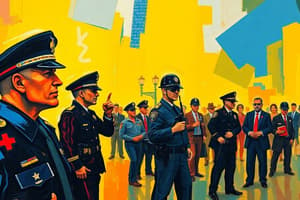Podcast
Questions and Answers
What can be a significant outcome of police deviance in terms of public perception?
What can be a significant outcome of police deviance in terms of public perception?
- Stronger cooperation between the police and local businesses
- Heightened feelings of betrayal among citizens (correct)
- Increased community trust in law enforcement
- Greater opportunities for police-community initiatives
Which form of police deviance involves accepting kickbacks for referrals?
Which form of police deviance involves accepting kickbacks for referrals?
- Shakedowns
- Opportunistic theft
- Corruption (correct)
- Direct criminal activities
Which factor increases the risk of police corruption by blending legality and illegality?
Which factor increases the risk of police corruption by blending legality and illegality?
- Thorough supervision by senior officers
- Use of informants in investigations (correct)
- High visibility of police work
- Frequent interactions with community members
What is a consequence of planting illegal evidence by police officers?
What is a consequence of planting illegal evidence by police officers?
What is a common form of police corruption involving theft during drug arrests?
What is a common form of police corruption involving theft during drug arrests?
What can happen to cases involving excessive police violence?
What can happen to cases involving excessive police violence?
What type of police deviance involves officers selling sensitive information for personal gain?
What type of police deviance involves officers selling sensitive information for personal gain?
What is a defining characteristic of systemic corruption within police forces?
What is a defining characteristic of systemic corruption within police forces?
What term describes the practice of selective enforcement favoring dominant groups?
What term describes the practice of selective enforcement favoring dominant groups?
What was a significant finding of Wortley's work regarding black men in Canada?
What was a significant finding of Wortley's work regarding black men in Canada?
Which term refers to the rationale that corrupt actions may be justified by noble intentions?
Which term refers to the rationale that corrupt actions may be justified by noble intentions?
What was a major contributing factor to police deviance highlighted in the content?
What was a major contributing factor to police deviance highlighted in the content?
How did Ontario and Nova Scotia react to findings of discriminatory street checks?
How did Ontario and Nova Scotia react to findings of discriminatory street checks?
What type of police control aims to address the unethical behavior of officers by means of leadership and supervision?
What type of police control aims to address the unethical behavior of officers by means of leadership and supervision?
What was a primary focus of the Knapp Commission investigations?
What was a primary focus of the Knapp Commission investigations?
Which type of violence is mentioned as sometimes unjustifiable but often supported by police culture?
Which type of violence is mentioned as sometimes unjustifiable but often supported by police culture?
Which method has been suggested to improve police integrity by preemptively addressing potential misconduct?
Which method has been suggested to improve police integrity by preemptively addressing potential misconduct?
What was one limitation identified in the internal investigations of the RCMP Complaints Commission?
What was one limitation identified in the internal investigations of the RCMP Complaints Commission?
Which external control mechanism aims to ensure police accountability to the community?
Which external control mechanism aims to ensure police accountability to the community?
Which social issue is highlighted as a contributing factor to illegal violence by police officers?
Which social issue is highlighted as a contributing factor to illegal violence by police officers?
What issue is raised regarding police unions in the context of controlling police behavior?
What issue is raised regarding police unions in the context of controlling police behavior?
What factor does the content suggest does NOT influence police deviance significantly in Canada?
What factor does the content suggest does NOT influence police deviance significantly in Canada?
Flashcards
Police Deviance
Police Deviance
When police officers abuse their power and violate the law or ethical standards.
Consequences of Police Deviance
Consequences of Police Deviance
Negative impacts on individuals, society, and the criminal justice system, including mistrust, wrongful convictions, and a decline in public support for the police.
Planting Illegal Evidence
Planting Illegal Evidence
A serious form of police deviance where officers fabricate evidence to frame individuals, leading to wrongful convictions.
Types of Police Corruption
Types of Police Corruption
Signup and view all the flashcards
Free Services as Corruption
Free Services as Corruption
Signup and view all the flashcards
Kickbacks
Kickbacks
Signup and view all the flashcards
Opportunistic Theft
Opportunistic Theft
Signup and view all the flashcards
Shakedowns
Shakedowns
Signup and view all the flashcards
Discriminatory Policing
Discriminatory Policing
Signup and view all the flashcards
Racial Profiling
Racial Profiling
Signup and view all the flashcards
DWB (Driving While Black)
DWB (Driving While Black)
Signup and view all the flashcards
Street Checks (Carding)
Street Checks (Carding)
Signup and view all the flashcards
Abuse of Power
Abuse of Power
Signup and view all the flashcards
Noble Cause Corruption
Noble Cause Corruption
Signup and view all the flashcards
Police Subculture
Police Subculture
Signup and view all the flashcards
Internal Controls
Internal Controls
Signup and view all the flashcards
External Controls
External Controls
Signup and view all the flashcards
Ethically-Based Training
Ethically-Based Training
Signup and view all the flashcards
Civilian Oversight
Civilian Oversight
Signup and view all the flashcards
RCMP Complaints Commission
RCMP Complaints Commission
Signup and view all the flashcards
Police Resistance to Reform
Police Resistance to Reform
Signup and view all the flashcards
Importance of External Oversight
Importance of External Oversight
Signup and view all the flashcards
Study Notes
Police Deviance and Corruption
- Police officers are granted significant authority, and power abuse is a serious concern. Abuse violates trust, impacting individual liberties and rights. Examples include planting evidence leading to wrongful convictions, unlawful violence causing injury or death, and theft.
- Public consequences of police misconduct include cynicism, mistrust, and feelings of betrayal, which can then legitimize criminal behavior within the population. It undermines the entire criminal justice system's operation and credibility.
- Police corruption can be individual or systemic. Examples range from accepting free meals or services, demanding kickbacks, and theft of evidence, to shakedowns and protecting illegal activities. This can include accepting bribes to fix cases, involvement in direct criminal activity (drug dealing, burglary, assault), leaking information, and systemic indoctrination early in an officer's career.
Types of Police Deviance
- Corruption:
- Taking bribes or kickbacks from individuals, businesses (i.e. towing companies), or other parties.
- Engaging in opportunistic theft: commonly associated with drug arrests but applicable to other situations.
- Participating in shakedowns: extorting money through threats or accepting bribes to ignore laws; includes sexual favors.
- Protecting illegal activities: systemic corruption where officers tolerate and possibly participate in illegal actions.
- Direct Criminal Activities: Officers directly engaging in crimes like drug dealing, burglary, or sexual assault.
- Selling Information: Sharing sensitive information with criminals for financial gain.
- Misconduct: In addition to physical violence, also includes the abuse of powers by releasing names of license plate owners to those at protests like those of the abortion clinic.
Factors Contributing to Corruption
- Nature of Police Work:
- Discretionary power: often in situations with limited visibility.
- Frequent contact with criminals: financial incentives.
- Some police activities; protecting informants can involve condoning or hiding criminal behavior.
- Subculture:
- Secrecy, loyalty, and solidarity within police departments. Attitudes of integrity impacted by different police organizations, thus impacting officers' behaviors.
- This can provide context for a "noble cause corruption," potentially influenced by factors including intent of officers' actions and the police subculture. This often leads to more difficult convictions.
Discriminatory Policing
- Selective enforcement favoring dominant groups based on race, class, and ethnicity; examples include apartheid in South Africa, and discrimination in U.S. South.
- Discriminatory practices: limiting the rights of minority groups; examples include the use of 'pass laws'.
- Racial profiling/ actions: including "starlight tours" resulting in convictions, and disproportionate stops, with examples including airport screening, traffic stops, and "stop and frisk."
- Studies show disproportionate detentions or arrests of specific racial or ethnic groups, and are also more likely to be detained after arrest. A prominent example is the over and disproportionate use of street checks (carding) against racialized groups, leading to bans in Ontario and Nova Scotia.
Other Types of Police Deviance
- Abuse of Powers: Police misconduct in terms of excessive force or misusing powers.
- Political Involvement:
- Involvement in political processes (i.e. RCMP commissioner in 2006 federal election).
- Noble Cause Corruption: acting in what they believe is morally correct, potentially resulting in corrupt actions.
- Internal Factors: Issues like sexual harassment and bullying creating negative working environment, reported in many RCMP cases, resulting in lawsuits.
Illegal Violence
- Reasons for police violence:
- Misuse of authorized force in ambiguous scenarios.
- Natural human reaction in stressful situations.
- Attempts to gain respect or gather intelligence.
- Punishing individuals thought to avoid legal consequences.
- The police subculture may support such behaviors.
- Examples including Rodney King event, G20 protests, Ottawa Police Cells, and the case of Dziekanski.
Factors Contributing to Illegal Violence
- The police subculture: fosters secrecy, loyalty, and solidarity, hindering accountability.
- Police organization: varying attitudes towards integrity among different organizations.
- Status and pay (low pay in certain U.S. locales) may be incentives for unlawful behavior.
Controlling Police Deviance
- Internal Controls:
- Strong leadership and supervision.
- Ethically-based training and evaluations.
- Proactive integrity tests.
- External Controls:
- Special investigations (e.g., Knapp Commission, Braidwood Inquiry).
- Criminal prosecutions.
- Community pressure.
- Civilian oversight.
- Media scrutiny.
- Oversight needs:
- National systems needed to investigate police misconduct, addressing issues of conflicts of interest.
- Issues within the RCMP complaints commission were raised about capacity and practices.
Studying That Suits You
Use AI to generate personalized quizzes and flashcards to suit your learning preferences.




